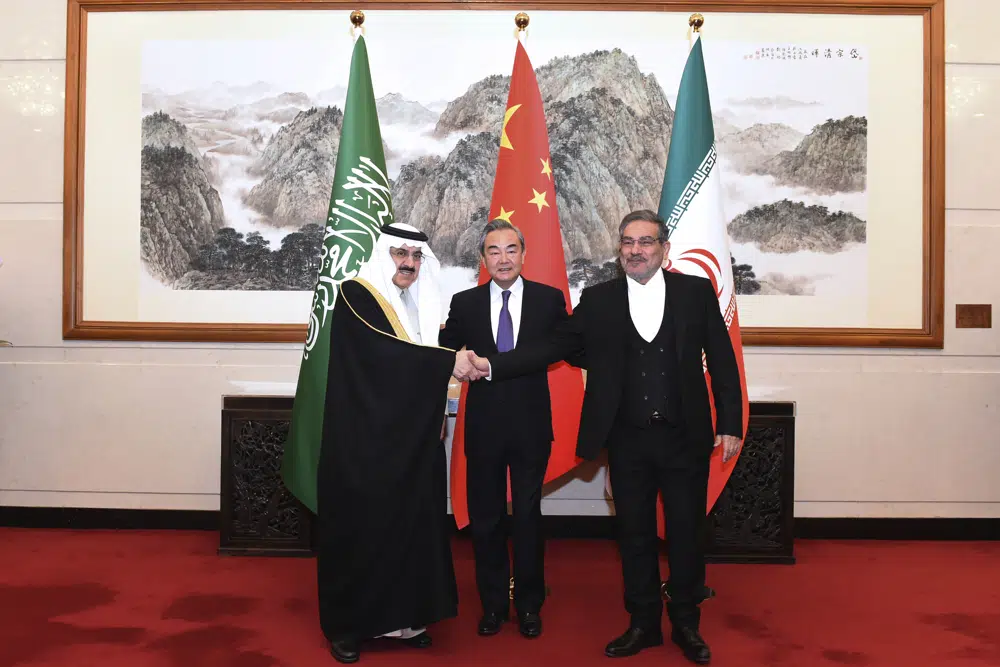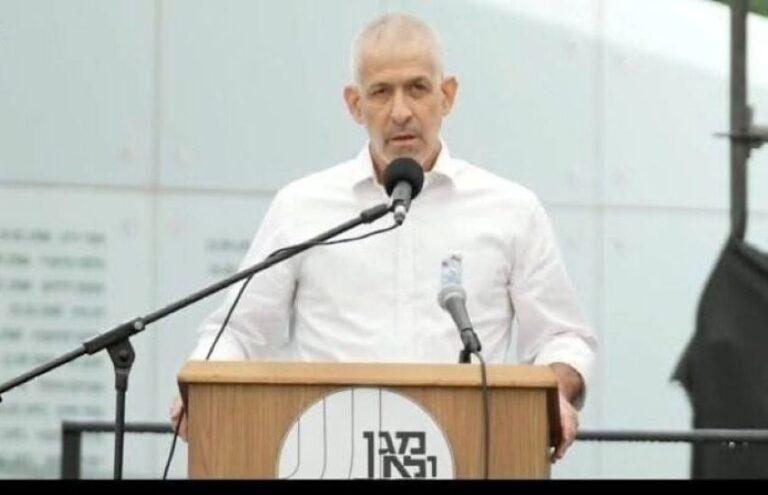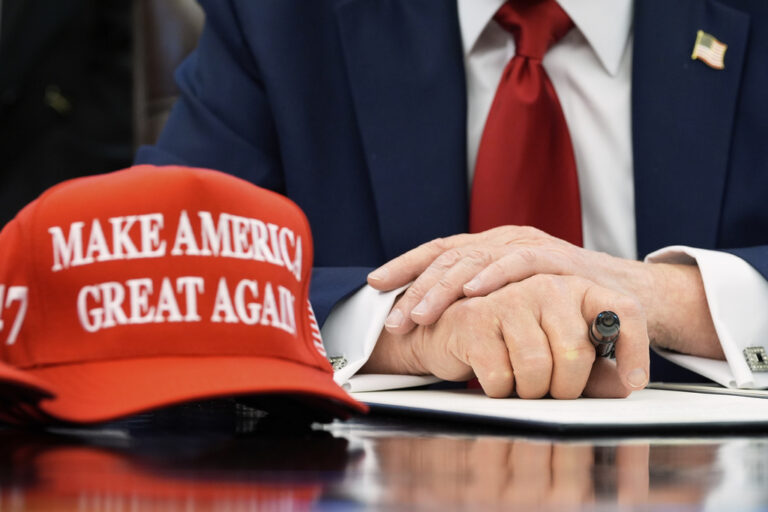The news of the rapprochement between long-time regional rivals Saudi Arabia and Iran sent shockwaves through the Middle East on Saturday and struck a symbolic blow for Israeli Prime Minister Benjamin Netanyahu, who has made the threat posed by Tehran a public diplomacy priority and personal crusade.
The breakthrough — a culmination of more than a year of negotiations in Baghdad and more recent talks in China — also became ensnared in Israel’s internal politics, reflecting the country’s divisions at a moment of national turmoil.
The agreement, which gives Iran and Saudi Arabia two months to reopen their respective embassies and re-establish ties after seven years of rupture, more broadly represents one of the most striking shifts in Middle Eastern diplomacy over recent years. In countries like Yemen and Syria, long caught between the Sunni kingdom and the Shiite powerhouse, the announcement stirred cautious optimism.
In Israel, it caused disappointment — along with a cascade of finger-pointing.
One of Netanyahu’s greatest foreign policy triumphs remains Israel’s U.S.-brokered normalization deals in 2020 with four Arab states, including Bahrain and the United Arab Emirates — part of a wider push to isolate and oppose Iran in the region.
He has portrayed himself as the only politician capable of protecting Israel from Tehran’s rapidly accelerating nuclear program and regional proxies, like Hezbollah in Lebanon and Hamas in the Gaza Strip. Israel and Iran have also waged a regional shadow war that has led to suspected Iranian drone strikes on Israeli-linked ships ferrying goods in the Persian Gulf, among other attacks.
A normalization deal with Saudi Arabia, the most powerful and wealthy Arab state, would fulfill Netanyahu’s prized goal, reshaping the region and boosting Israel’s standing in historic ways. Even as backdoor relations between Israel and Saudi Arabia have grown, the kingdom has said it won’t officially recognize Israel before a resolution to the decadeslong Israeli-Palestinian conflict.
Since returning to office late last year, Netanyahu and his allies have hinted that a deal with the kingdom could be approaching. In a speech to American Jewish leaders last month, Netanyahu described a peace agreement as “a goal that we are working on in parallel with the goal of stopping Iran.”
But experts say the deal that broke out Friday has thrown cold water on those ambitions. Saudi Arabia’s decision to engage with its regional rival has left Israel largely alone as it leads the charge for diplomatic isolation of Iran and threats of a unilateral military strike against Iran’s nuclear facilities. The UAE also resumed formal relations with Iran last year.
“It’s a blow to Israel’s notion and efforts in recent years to try to form an anti-Iran bloc in the region,” said Yoel Guzansky, an expert on the Persian Gulf at the Institute for National Security Studies, an Israeli think tank. “If you see the Middle East as a zero-sum game, which Israel and Iran do, a diplomatic win for Iran is very bad news for Israel.”
Even Danny Danon, a Netanyahu ally and former Israeli ambassador to the U.N. who recently predicted a peace agreement with Saudi Arabia in 2023, seemed disconcerted.
“This is not supporting our efforts,” he said, when asked about whether the rapprochement hurt chances for the kingdom’s recognition of Israel.
In Yemen, where the rivalry between Saudi Arabia and Iran has played out with the most destructive consequences, both warring parties were guarded, but hopeful.
A Saudi-led military coalition intervened in Yemen’s conflict in 2015, months after the Iran-backed Houthi militias seized the capital of Sanaa in 2014, forcing the internationally recognized government into exile in Saudi Arabia.
The Houthi rebels welcomed the agreement as a modest but positive step.
“The region needs the return of normal relations between its countries, through which the Islamic society can regain security lost from foreign interventions,” said Houthi spokesman and chief negotiator Mohamed Abdulsalam.
The Saudi-backed Yemeni government expressed some optimism — and caveats.
“The Yemeni government’s position depends on actions and practices not words and claims,” it said, adding it would proceed cautiously “until observing a true change in (Iranian) behavior.”
Analysts did not expect an immediate settlement to the conflict, but said direct talks and better relations could create momentum for a separate agreement that may offer both countries an exit from a disastrous war.
“The ball now is in the court of the Yemeni domestic warring parties to prioritize Yemen’s national interest in reaching a peace deal and be inspired by this initial positive step,” said Afrah Nasser, a non-resident fellow at the Washington-based Arab Center.
Anna Jacobs, senior Gulf analyst with the International Crisis Group, said she believed the deal was tied to a de-escalation in Yemen.
“It is difficult to imagine a Saudi-Iran agreement to resume diplomatic relations and re-open embassies within a two-month period without some assurances from Iran to more seriously support conflict resolution efforts in Yemen,” she said.
War-scarred Syria similarly welcomed the agreement as a move toward easing tensions that have exacerbated the country’s conflict. Iran has been a main backer of Syrian President Bashar Assad’s government, while Saudi Arabia has supported opposition fighters trying to remove him from power.
The Syrian Foreign Ministry called it an “important step that will lead to strengthening security and stability in the region.”
In Israel, bitterly divided and gripped by mass protests over plans by Netanyahu’s far-right government to overhaul the judiciary, politicians seized on the rapprochement between the kingdom and Israel’s archenemy as an opportunity to criticize Netanyahu, accusing him of focusing on his personal agenda at the expense of Israel’s international relations.
Yair Lapid, the former prime minister and head of Israel’s opposition, denounced the agreement between Riyadh and Tehran as “a full and dangerous failure of the Israeli government’s foreign policy.”
“This is what happens when you deal with legal madness all day instead of doing the job with Iran and strengthening relations with the U.S.,” he wrote on Twitter. Even Yuli Edelstein from Netanyahu’s Likud party blamed Israel’s “power struggles and head-butting” for distracting the country from its more pressing threats.
Another opposition lawmaker, Gideon Saar, mocked Netanyahu’s goal of formal ties with the kingdom. “Netanyahu promised peace with Saudi Arabia,” he wrote on social media. “In the end (Saudi Arabia) did it … with Iran.”
Netanyahu, on an official visit to Italy, declined a request for comment and issued no statement on the matter. But quotes to Israeli media by an anonymous senior official in the delegation sought to put blame on the previous government that ruled for a year and a half before Netanyahu returned to office. “It happened because of the impression that Israel and the U.S. were weak,” said the senior official, according to the Haaretz daily, which hinted that Netanyahu was the official.
Despite the fallout for Netanyahu’s reputation, experts doubted a detente would harm Israel. Saudi Arabia and Iran will remain regional rivals, even if they open embassies in each other’s capitals, said Guzansky. And like the UAE, Saudi Arabia could deepen relations with Israel even while maintaining a transactional relationship with Iran.
“The low-key arrangement that the Saudis have with Israel will continue,” said Umar Karim, an expert on Saudi politics at the University of Birmingham, noting that the Israeli occupation of the West Bank remained more of a barrier to Saudi recognition than differences over Iran. “The Saudi leadership is engaging in more than one way to secure its national security.”
(AP)












13 Responses
Torah-true Jews should be thrilled with this wonderful news! As the navi Yirmiyahu states (29:7) “Seek the peace and prosperity of the city to which I have carried you into exile.”
But as expected, the Zionists ימ”ש are very disappointed, because the Zionists only want peace when it will advance their economic and militaristic ventures and further their incessant warmongering worldwide. True peace is anathema to Zionist כוחי ועוצם ידי, as my mentors from Neturei Karta ‘שיחי have been protesting for decades.
Seeing this Chinese dude atanding there as if he is Jimmy Peanut Man Carter should be a rude awakening for the US also. It should raise concern that China is pulling ahead of the US as a world leader.
YNE, bragging that your “mentors” are Neturei Karta is not a good way to go thru life. Perhaps you need to crawl back into your basement and seriously think about things.
Yousuf Name Edited, our very own Al Jazeera journalist seems to claim that a powerful Iran and Saudi Arabia is very conducive to the safety of American and Israeli (Palestinian?) Jewry.
Yousuf, you think that us Jews are like you Arabs. You’re wrong. We don’t rejoice when our brothers and sisters are in danger.
I hate Zionism with a passion, I feel that it brought tremendous destruction to Judaism and is completely against the Torah.
However, when a regime wants to put fellow Jews of US and Eretz Yisroel in danger, I pray for their safety. I don’t care what opinions they have or what movement they belong to.
We don’t treat fellow Jews like Shiites vs. Sunnis להבדיל.
My question to YNE is
If Iran drops a nuke on Israel would you be happy?
takamamash – you definitely need to crawl out of YOUR basement and smell the true Daas Torah of the Gedolim שליט”א who oppose the Zionist התגרות באומות.
Menachem Shmei – please help me understand your contradictory response: You write that you “hate Zionism with a passion” and it “brought tremendous destruction to Judaism” (which is commendable, I appreciate it 🙂 ).
But in the very next sentence you write that Iran “wants to put fellow Jews of US and Eretz Yisroel in danger.” Well then aren’t you buying into the pernicious Zionist myth that they bear no guilt for warmongering against the Arabs and brutally occupying Palestine while the Muslims want to destroy “Israel” only because of ingrained antisemitism??
As they say in yeshivish: lehefich!! It is the Zionist State of “Israel” which is putting Jews the world over in danger!! If you really care about the safety of the Jews, you should be praying for the demise of the Zionists (or at least for them to do teshuva), not for their continuation!!
coffee addict – and your idol Bibi Netanyahu ימ”ש is going to prevent that from happening?
“takamamash – you definitely need to crawl out of YOUR basement and smell the true Daas Torah of the Gedolim שליט”א who oppose the Zionist התגרות באומות.”
Maybe they’re wrong. Gedolim are human like everyone else, you know.
“Maybe they’re wrong. Gedolim are human like everyone else, you know” – AFRA LEPUMEI!! It’s mamash a ספק if I have to reiss kriah after hearing such apikorsus and ביזיון התורה!!
YNE,
I never said that I’m just wondering if you would be happy “all the רשעים in Israel” will die including yeshivaleit and gedolim
Your “Gedolim” are NOT gedolim. They are not even Jews. והגבעונים לא מבני ישראל המה. Your “gedolim” have shown by their behavior that their yichus is very suspect.
YNE, you are a רשע; please do us yidden all a big favor and move to Iran.
Yossi, (Yemach Shimcha) can I have your full name so I can have you in mind in Laminim al tehi tikva?
You filthy ashkeNAZI scum, check your Yichus, Jew hater.